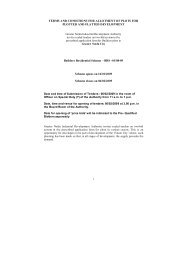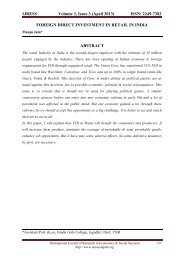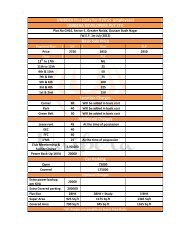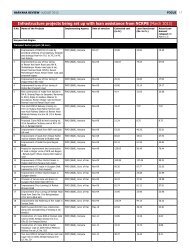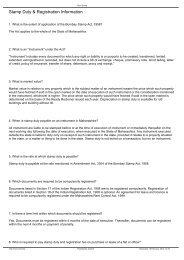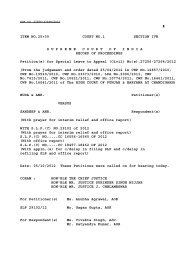eLegalix - Allahabad High Court Judgment Information System ...
eLegalix - Allahabad High Court Judgment Information System ...
eLegalix - Allahabad High Court Judgment Information System ...
You also want an ePaper? Increase the reach of your titles
YUMPU automatically turns print PDFs into web optimized ePapers that Google loves.
JUDGMENT/ORDER IN - WRIT - C No. 37443 of 2011 at <strong>Allahabad</strong> Dated-21.10....http://elegalix.allahabadhighcourt.in/elegalix/WebShow<strong>Judgment</strong>.doPage 150 of 19710/21/2011In this context, it is relevant to refer to a Division Bench judgment of this <strong>Court</strong> in the case of Smt. Manju LataAgarwal vs. State of U.P. and others reported in 2007(9) ADJ 447 and judgment of the Apex <strong>Court</strong> in the case ofSibban Lal Saxena vs. State of U.P. and others reported in AIR 1954 SC 179 in which it has been held that evenin event of the grounds on the basis of which subjective satisfaction has arrived is held to be irrelevant, the entiresatisfaction is vitiated. Following was laid down by the Apex <strong>Court</strong> in paragraph 8, which is as under:-"8. ..... The Government itself, in its communication dated the 13th of March, 1953, has plainly admitted that oneof the grounds upon which the original order of detention Was passed is unsubstantial or nonexistent and cannotbe made a ground of detention. The question is, whether in such circumstances the original order made undersection 3 (1) (a) of the Act can be allowed to stand. The answer, in our opinion, can only be in the negative. Thedetaining authority gave here two grounds for detaining the petitioner. We can neither decide whether thesegrounds are good or bad, nor can we attempt to assess in what manner and to what extent each of these groundsoperated on the mind of the appropriate authority and contributed to the creation of the satisfaction on the basis ofwhich the detention order was made. To say that the other ground, which still remains, is quite sufficient to sustainthe order, would be to substitute an objective judicial test for the subject decision of the executive authority whichis against the legislative policy underlying the statute. In such cases, we think, the position would be the same asif one of these two grounds was irrelevant for the purpose of the Act or was wholly illusory and this would vitiatethe detention order as a whole. Principle, which was order as a whole. This principle, which was recognised bythe Federal <strong>Court</strong> in the case of Keshav Talpade v. The Kingb Emperor (2), seems to us to be quite sound andapplicable to the facts of this case. (1) Vide state of Bombay v. Atma Ram Sridhar Vaidya, [1951] S.C.R."The next recent judgment of the Apex <strong>Court</strong> to be noticed is the judgment in the case of Greater Noida IndustrialDevelopment Authority vs. Devendra Kumar and others reported in 2011(6) (SC) ADJ 480. The aforesaid casealso was a case pertaining to village Shahberi of district Gautam Budh Nagar in which notifications were issuedfor the same purpose. The writ petition was filed challenging the notifications which was allowed by the <strong>High</strong> <strong>Court</strong>holding the invocation of urgency clause as illegal. The Greater NOIDA filed the appeal which was dismissed. Thejudgment of Radhy Shyam's case (supra) was referred to and relied. In the aforesaid case the ground ofunauthorised colony and illegal construction was put forward by the appellant which was not accepted. Followingwas observed in paragraph 24 of the said judgment:-"24. At the outset, we deem it proper to observe that none of the Senior Counsel appearing for the petitionersassailed the finding recorded by the <strong>High</strong> <strong>Court</strong> that the decision of the State Government to invoke the urgencyprovisions contained in Section 17(1) and to dispense with the application of Section 5A was vitiated due toarbitrary exercise of power and non application of mind. Of course, Shri L.N. Rao and Shri Dushyant A. Dave,learned Senior Counsel did suggest that Section 17(1) and (4) was invoked to check mushroom growth ofunauthorised colonies in the area around Greater Noida Phase I, but in our view, this did not provide a validjustification to invoke Section 17(1) and to dispense with the application of Section 5A and the <strong>High</strong> <strong>Court</strong> rightlynullified this exercise by relying upon the judgments of this <strong>Court</strong> in Anand Singh's case and Radhy Shyam'scase. We may add that unauthorised plotting of agricultural land or large scale illegal constructions could not havebeen possible without active or tacit connivance of the functionaries and officers of the State and/or itsagencies/instrumentalities. If the Authority wanted to prevent unauthorised colonization of agricultural land orillegal constructions, then nothing prevented it from taking action under Section 9 of the 1976 Act. No explanationhas been given by the State Government and the Authority as to why appropaite measures were not taken toprevent unauthorised colonization of land in Shahberi and elsewhere. The inefficiency of the State apparatus totake action in accordance with law cannot be used as a tool to justify denial of opportunity of hearing to thelandowners and other interested persons in terms of Section 5A of the 1894 Act."Apart from the original record of village Patwari, we have perused the original records of other villages. Forexample, land acquisition proceedings of village Roja Yakubpur along with the proposal of land acquisitionforwarded by Director, Land Acquisition Directorate dated 14th February, 2006, certificate in Prapatra-10 by theCollector in which same wordings were repeated that for completion of project the possession of the land is to beimmediately taken and on invocation of Section 17 the provisions of Section 5A are dispensed with and he is fullysatisfied with the justification for dispensation of inquiry. In the Note submitted by Greater NOIDA regardingjustification for issuing notification under Section 4/17 it was mentioned that several applicants want allotment ofplots which is not being possible due to acquisition of the land. It was stated that specially the reputed industrialorganisations of foreign countries want allotment and to invest in the State and in case the land is not allottedimmediately, the units might go to other States. These were the reasons which have been repeated in all suchcertificates. It is also to be noticed that all the certificate, which have been submitted in all the case, does not bearany date and appears to have been mechanically prepared using the same words. It is also relevant to notice thatpetitioners in the writ petition have pleaded that there was no such need of the GNOIDA which necessitated suchlarge scale acquisition of fertile agricultural land. It has further been pleaded that the respondents in their counter





